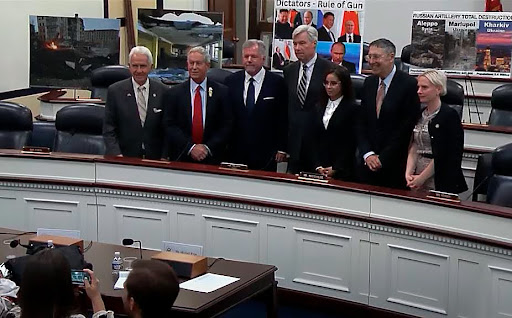WASHINGTON — As Russian forces advance their new offensive in the Kharkiv region, the United States Commission on Security and Cooperation in Europe gathered Thursday to discuss Ukraine’s defensive needs to inform the development of future military aid packages.
“Ukrainian victory will happen not because Putin comes to his senses, but when Ukraine has achieved clear military superiority,” said Commission Chairman Rep. Joe Wilson, R-S.C.
Congress members discussed the current battlefield situation and how the recent bipartisan passage of supplemental aid for Ukraine could affect it.
According to Nataliya Bugayova, a non-resident fellow at the Institute for the Study of War, Western aid delays have led to the frontline’s destabilization, and the battlefield situation will likely get worse before it gets better.
“Ukraine, however, will be able to stabilize the front line as the aid arrives,” she said.
Bugayova warned that slow U.S. decision-making contributes to the lost opportunities for Ukraine and gives advantage to Russia in the war, which has been acting strategically to deter the process for the last two years.
“The outcome of the war depends as much on our decision-making speed as it does on the military capability,” she said.
Sen. Sheldon Whitehouse, D-R.I., agreed that the U.S. strategy towards the Russian war in Ukraine has been unsuccessful, recalling the initial mainstream belief that Ukraine would be defeated in five days to two weeks.
“We would add strategic value to the Ukrainians as they find the way to victory,” he said. “But so far, we have managed to get most things wrong.”
Rep. Marc Veasey, D-Texas, highlighted that the U.S. should show more commitment to maintaining peace and prosperity in Europe. He stressed that not enough actions of the U.S. and its allies in Europe could affect other countries.
“If we don’t stop Putin now and it spreads beyond Ukraine and it goes into Romania, Estonia, we will have a lot more bloodshed,” Veasey said.
Former Deputy Assistant Secretary of Defense for Europe and NATO, Michael Ryan, expressed concerns about the safety of the whole NATO territory. Moreover, he said, it undermines the credibility of NATO and the U.S. abroad, most notably in China and Taiwan.
Ukraine cannot win on defense, Ryan stressed, and it should be provided with air and electromagnetic spectrum superiority, as well as unmanned combat aerial vehicles and long-range fires.
“To provide the weapons, we should fully exploit the Defense Production Act,” he said. “Russia’s economy is on the war footing; ours is not.”
Bugayova further highlighted the need for Ukraine to be able to target Russia’s military and defense capabilities without any constraints, and Rep. Jim Costa, D-Calif., agreed with her.
“They are offensive, they are the aggressor,” Costa said. “And I don’t see how you can conduct any legitimate counter-strategy without doing that.”
As the U.S. and its allies continue the discussion of future aid to Ukraine, the Commission agreed that time is a key factor in whether Ukraine will be defeated or, along with its partners, will win the war against Russia.
“Whether Ukraine is on the path to victory depends in large part on whether the U.S. learns critical lessons from the last two years of this war,” Bugayova said.



